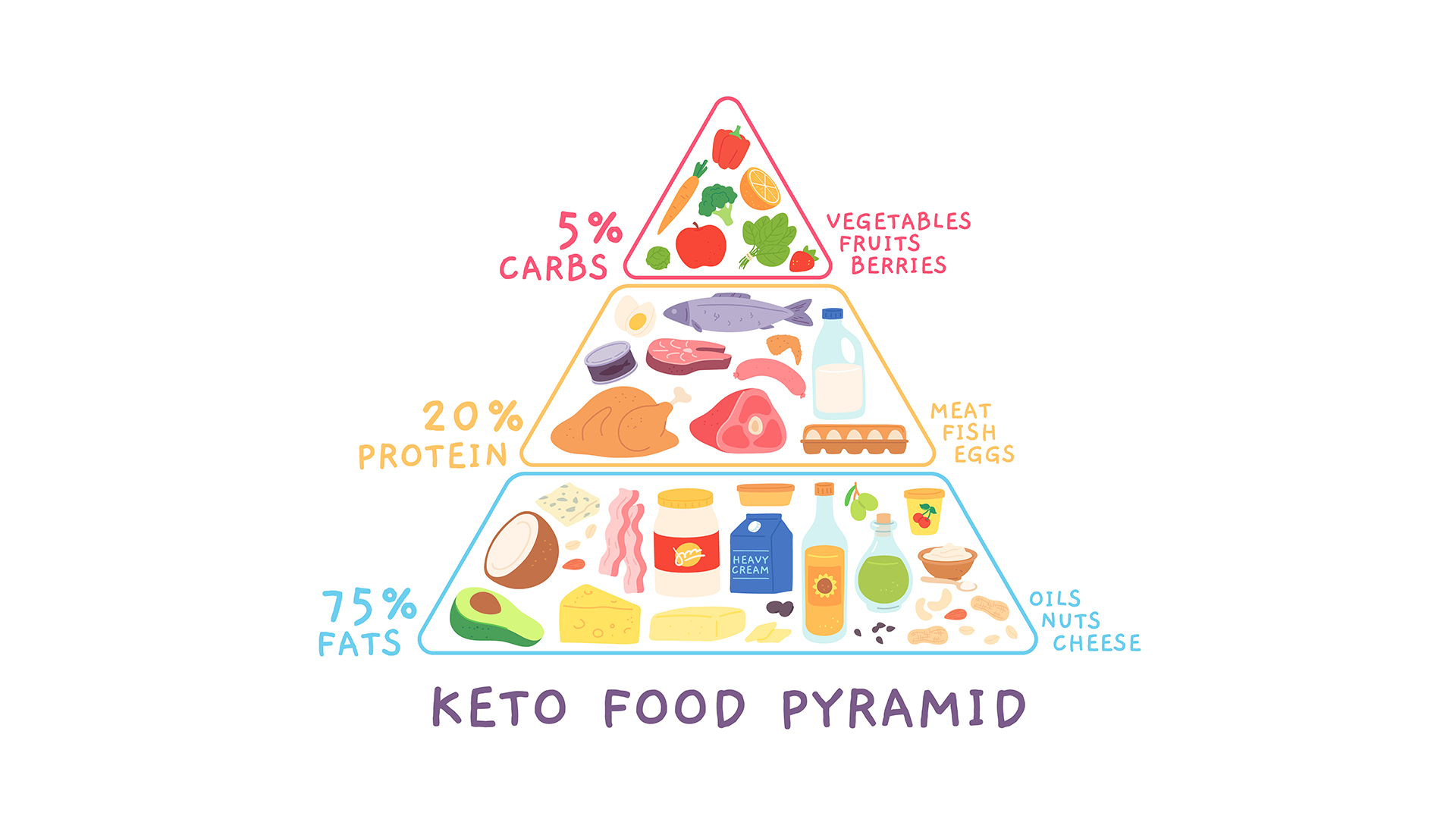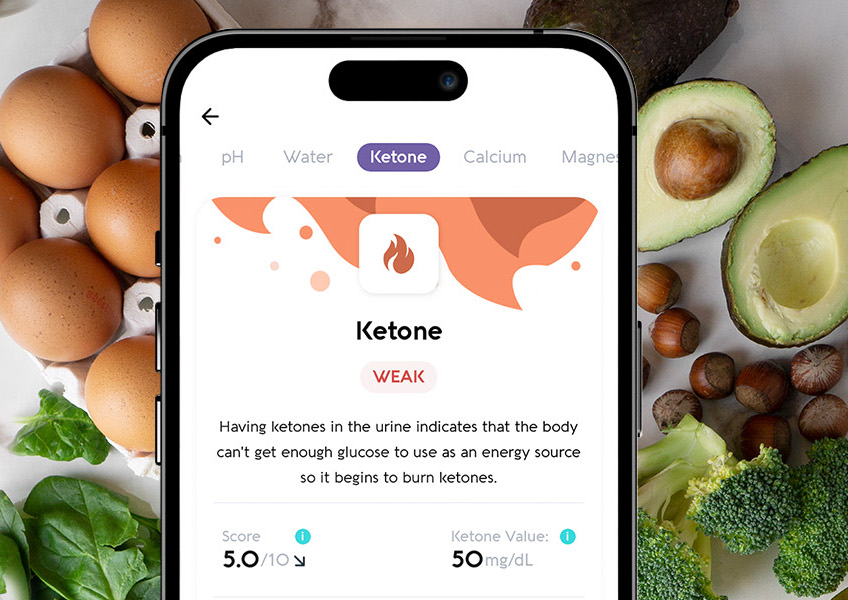Ever wondered how the body taps into its fat stores for a powerful energy boost? Discover the enigmatic world of ketosis, where the body's natural fat-burning prowess takes center stage.
Ketones are substances produced by the liver when fat is burned for energy. Ketosis is a metabolic state that occurs when the body, which normally relies on carbohydrates for energy, is in a situation where carbohydrate intake is limited. In this state, the body starts to burn fat for energy, resulting in the production of molecules called ‘ketone bodies.’ These ketone bodies can be utilized by the brain and other tissues to provide energy. Ketosis can arise from following a specific diet such as the ketogenic diet or due to certain health conditions like insulin deficiency.
In this blog post, let's explore the world of ketosis, understanding its origins, effects, and management in this informative blog post. Let's dive in!
What is Ketosis?
Ever wondered how our bodies adapt to extreme conditions when glucose, the usual energy source, becomes scarce? Ketosis is a metabolic state in which the body produces high levels of ketones, which can be detected in the urine. It occurs when the body does not have enough glucose (a type of sugar) for energy, so it breaks down fat for fuel instead. Ketosis can be a normal and healthy process, but if a special low-carbohydrate diet is not followed, high levels of ketones in the urine can be a sign of an underlying issue, such as malnourishment or a different health condition.
Ketosis kicks in when your body faces a shortage of glucose, either due to prolonged fasting, strict dieting, or periods of starvation. As glucose levels dip, cells that typically thrive on this energy source are left wanting, and this is where the magic happens. The hormone insulin level takes a backseat, triggering a release of fatty acids from your body's fat stores.
Now, don't think of these fatty acids as villains! They embark on a journey to the liver, where they undergo oxidation and transform into ketone bodies—energetic little powerhouses also known as ketones. Think of them as your body's secret weapon against energy scarcity!
Here's where it gets even more fascinating. Unlike fatty acids, ketones have a unique talent—they can effortlessly cross the blood-brain barrier. This means that even in the absence of glucose, they provide your brain with the fuel it needs to keep you sharp and focused.
What causes ketosis?
Ketosis is caused mostly by a significant decrease in carbohydrate intake and an increasing reliance on fatty acids for fuel. When the body obtains a restricted amount of carbs, usually less than 50 grams of carbohydrates per day, it begins to deplete its glycogen stores in the liver and muscles. As glycogen levels fall, the body turns to stored fat for energy.
The liver is important in ketosis. Through a process known as lipolysis, it converts stored fat into fatty acids. These fatty acids are subsequently converted into ketone bodies in the liver via a process known as ketogenesis. The three main ketone bodies produced during this process are acetoacetate, beta-hydroxybutyrate, and acetone. These ketone bodies enter the bloodstream and provide an effective energy source for different organs, including the brain.
Ketosis is most often associated with low-carbohydrate diets, such as the ketogenic diet, in which the primary macronutrient focus is on high-fat and moderate-protein intake. As the body adjusts to the lack of food and begins utilizing its fat reserves for energy, extended fasting periods can also cause ketosis.
It is important to remember that, while ketosis might provide benefits such as weight loss and greater mental clarity, it may not be appropriate for everyone. Individuals with specific medical issues, such as diabetes or metabolic disorders should proceed with caution and seek medical advice before making large dietary changes. There are several potential causes of ketosis, including:
- Diabetes: High levels of ketones in the urine can be a sign of uncontrolled diabetes, particularly type 1 diabetes. With diabetes, the body is unable to properly use and store glucose, leading to high levels of ketones in the urine and blood.
- Starvation or malnutrition: Prolonged periods of starvation or malnutrition can cause the body to break down fat for energy, leading to high levels of ketones in the urine.
- Alcoholism: Alcoholism can cause the body to break down fat for energy, leading to high levels of ketones in the urine.
- Certain medications: Some medications, such as diuretics and aspirin, can interfere with the body's metabolism and cause ketosis.
Monitoring and moderation are essential for achieving and maintaining ketosis safely.

What are the symptoms of ketosis?
Are you following a ketogenic diet? Wondering if you’ve achieved ketosis? Do you think something is wrong with your energy? The symptoms of ketones in the urine can vary depending on cause and its severity.
Some of these symptoms generally include:
- weight loss
- reduced appetite
- headache
- nausea
- fatigue
If you’re new to ketosis, you may experience the “keto flu,” which can result in headache, tiredness, nausea, and stomach upset. To know for sure if you’re in ketosis, you can check your ketone levels with a urine or blood measurer.
What are the complications of ketosis?
Exploring different dietary choices is a common step in maintaining a healthy lifestyle, and for many, ketosis has become increasingly popular. While ketosis provides advantages, it is critical to be aware of the potential drawbacks. If you're thinking about starting a ketogenic diet or are already on one, here are some important things to remember:
- Keto flu: During the early stages of entering ketosis, some people may experience what is referred to as the "keto flu." This syndrome causes fatigue, headache, nausea, and dizziness, which can be a result of electrolyte imbalances and dehydration caused by low carbohydrate intake.
- Nutrient deficiencies: Because many food sources rich in key nutrients are limited on a ketogenic diet, there is a danger of developing nutrient shortages. Important nutrients including fiber, vitamins (such Vitamin C and the B-complex), and minerals (like magnesium and potassium) may be deficient in the diet, which could result in a number of deficiencies.
- Constipation: Because of the low fiber content of a ketogenic diet, some people may become constipated. Lack of fiber can cause digestive discomfort because it is essential for supporting regular bowel motions and gut health.
- Increased cholesterol levels: Ketogenic diets are frequently high in fat, which can result in higher cholesterol levels in some people. While the consequences differ from person to person, it is critical to monitor cholesterol levels on a regular basis, especially if you have a history of cardiovascular problems.
- Social difficulties: Adopting a ketogenic diet might be difficult in social contexts where carbohydrates are popular. Maintaining the diet in such circumstances may result in feelings of loneliness and dissatisfaction.
While ketosis can be advantageous for some people, it's important to approach it with caution and be aware of the potential risks. If you're thinking about trying a ketogenic diet, talk to a doctor or a trained dietitian first to be sure it's a good fit for your health goals and physiology.
What are the side effects of ketosis?
In recent years, the ketogenic diet has gained immense popularity as a promising weight loss and health improvement strategy. While ketosis can be an effective tool for weight loss and metabolic health, it is critical to understand its potential adverse effects. You can follow a safe and balanced approach to your nutritional journey by being aware about these side effects of ketosis and using that knowledge to make well-informed decisions. Let's look at some of the potential adverse effects of ketosis:
- Short term side effects such as headaches, fatigue, constipation, thirst, and bad breath are possible, although they normally go away after a few days or weeks.
- Long term risks include kidney stones, high LDL (bad) cholesterol, and vitamin deficiencies.
- People who have a history of eating disorders should exercise caution because the strict limits might not be appropriate for them.
- Breastfeeding women should be careful because carbohydrates are important macronutrients for feeding the baby. Before starting this diet while breastfeeding, it is very important to consult a healthcare professional.
While the ketogenic diet has some advantages, it also has some drawbacks and is not suitable for everyone. If you're thinking of going on an extremely low-carb diet, talk to a doctor or nutritionist first to see if it's the best option for your specific needs and circumstances. When making food choices, always put your wellness first.

How is ketosis managed?
Ketosis is managed through a ketogenic diet, which involves consuming high fat, moderate protein, and low carbohydrate food. Monitoring carb intake, staying hydrated, and maintaining balanced nutrition are essential. Here are some common approaches to managing nutritional ketosis:
- Ketogenic diet: The ketogenic diet is a high-fat, low-carbohydrate, and moderate-protein diet designed to induce and maintain ketosis. It typically involves consuming 70-75% of calories from fat, 20-25% from protein, and 5-10% from carbohydrates. By restricting carbohydrate intake, the body shifts its primary fuel source from glucose to ketones, which are produced from fat metabolism.
- Adequate hydration: Maintaining proper hydration is crucial while following a ketogenic diet. Ketosis can cause increased water loss, so it's important to drink enough water to prevent dehydration.
- Checking ketone levels: People on a ketogenic diet can use various methods to check their ketone levels, such as urine ketone strips, blood ketone meters, or breath ketone analyzers. Keeping your ketone levels in check can help individuals assess their state of ketosis and adjust their dietary choices accordingly.
- Balanced nutrition: While a ketogenic diet is high in fats, it's essential to prioritize healthy fats, such as avocados, nuts, seeds, olive oil, and fatty fish. Protein should also be consumed in moderation to prevent excessive gluconeogenesis (the process by which the body converts protein into glucose.)
- Supplements: Some individuals may benefit from taking certain supplements, such as electrolytes (e.g., sodium, potassium, magnesium) to maintain proper mineral balance, especially during the initial adaptation phase when electrolyte imbalances may occur.
The management of ketosis depends on the underlying cause and severity of the condition. If the cause is uncontrolled diabetes, the process may involve insulin therapy to control blood sugar levels and prevent ketoacidosis. If the cause is undernourishment or alcoholism, the process may involve dietary changes to address these underlying conditions.
What is the ketosis diet?
The ketogenic diet is a highly effective low-carb, high-fat eating plan. The primary aim of this diet is to substantially decrease carbohydrate intake while increasing fat consumption, prompting the body to enter a metabolic state known as ketosis to lose weight.
In ketosis, the body's efficiency in burning fat for energy is remarkably enhanced, and the liver converts fat into ketones, which serve as an energy source for the brain. Furthermore, ketogenic diets can lead to significant reductions in blood sugar and insulin levels, accompanied by the positive impact of increased ketone production, which may offer health benefits.
What are the benefits of ketosis?
One of the most significant advantages of ketosis is its potential for aiding weight loss. By curbing appetite and reducing food consumption, this process can effectively lead to shedding excess pounds. Furthermore, it facilitates the reduction of belly fat (visceral fat) while preserving lean muscle mass. Additionally, ketosis shows promise in treating and managing various diseases, including:
- Epilepsy: According to a Pubmed article, doctors have also recommended the keto diet for children with epilepsy who do not respond to other forms of management to decrease the frequency of seizures.
- Other neurological conditions: The ketogenic diet has recently been examined as a supplemental strategy for a variety of neurological conditions. Ketones are a natural neuroprotective antioxidant that has been found to protect the brain from toxic reactive oxygen species. Ketones have been proven to boost mitochondrial efficiency and synthesis, which aids in the protection of brain cells from strokes and neurodegenerative disorders like Alzheimer's and Parkinson's.
- Type 2 diabetes: Ketogenic diets can aid individuals with Type 2 diabetes in weight loss and blood sugar level management.
How long does it take to get into ketosis?
If you consume between 20 and 50 grams of carbohydrates daily, it generally takes two to four days to enter ketosis. However, the time it takes to achieve this metabolic state can vary due to several factors, including age, carbohydrate, fat, and protein intake, physical activity level, metabolism, sleep health, and stress level.
In some cases, it may even take a week or longer to get into ketosis. Notably, if you start a keto diet after following a high-carb diet, reaching ketosis might take longer as your body needs to deplete its glucose stores first.
One potential way to expedite the process is through intermittent fasting. The most common method involves eating all your meals within an eight-hour window and fasting for the remaining 16 hours each day. This approach has shown promise in helping individuals enter ketosis faster.
How many carbs to stay in ketosis?
Certainly! Here's an alternative version:
According to a comprehensive review from 2018 analyzing different types of ketogenic diets, to maintain ketosis, individuals should limit their daily carbohydrate intake to a maximum of 50 grams (g).
The recommended daily protein intake for men and women following the ketogenic diet is 50–60 g for males and 40–50 g for women.
However, it is essential to recognize that various keto diets permit different proportions of carbs, protein, and fat:
- Standard ketogenic diet: This variant typically comprises 70% of total daily calories from fat, 20% from protein, and 10% from carbohydrates.
- Cyclical ketogenic diet: This approach involves cycling between 5 low-carb days and 2 high-carb days in a week.
- Targeted ketogenic diet: This plan allows individuals to incorporate more carbohydrates around high-intensity workout periods.
- High-protein ketogenic diet: Emphasizing a distribution of 60% calories from fat, 35% from protein, and 5% from carbohydrates in daily consumption.
Most studies have focused primarily on the standard keto diet, and experts who support ketogenic diets typically advocate for it.

Ketosis and the ketogenic diet
Ketosis, a widely embraced low-carb weight loss program, not only facilitates fat burning but also reduces feelings of hunger.
For individuals who are in good health without diabetes or pregnancy, ketosis typically initiates after 3 or 4 days of consuming less than 50 grams of carbohydrates daily, equivalent to approximately three slices of bread, a cup of low-fat fruit yogurt, or two small bananas. Alternatively, intermittent fasting can also be employed to kickstart ketosis.
A diet rich in fat and protein while extremely low in carbs is referred to as a ketogenic or "keto" diet.
Ketosis pills and drinks
Ketosis beverages and pills are dietary supplements that promise to assist the body to enter and stay in a state of ketosis. They frequently contain ingredients that are thought to support ketosis or the ketogenic diet. If you're thinking about them, it's important to speak with a healthcare provider or a registered dietitian to make sure they are safe and appropriate for your unique health needs and goals. Remember that a healthy lifestyle continues to be based on a balanced diet and regular exercise.
There are specific, well-known adverse effects of ketone drinks:
- Increased bowel movements: Ketone drinks can lead to stomach upset and an increase in bowel movements.
- Low blood sugar levels: Consuming ketone drinks may cause hypoglycemia, resulting in low energy levels. This could be hazardous for individuals with diabetes and may interact with existing medications.
- High Sodium: Ketone drinks often have high sodium content, which can lead to high blood pressure in some cases. Therefore, individuals diagnosed with hypertension should avoid them.
- Dehydration: During ketosis, the lack of starch and carbs in the diet can lead to dehydration. Consumption of such drinks can exacerbate dehydration.
Ketosis and ketoacidosis
Ketosis: Ketosis is a natural process that occurs when your body doesn't have enough sugar (glucose) for energy. It breaks down fat into molecules called ketones, which become an alternative fuel source. This often occurs with fasting, low-carb diets (like keto), intense exercise, or in people with Type 1 diabetes.
- It's a normal and controlled process that helps your body use stored fat for energy.
- It’s not harmful, and can even be helpful for weight loss and certain conditions.
- Ketone levels in the blood stay within a safe range (below 3.0 mmol/L).
Ketoacidosis: Ketoacidosis is a condition where ketone levels in the blood become dangerously high, leading to a significant drop in blood pH. It mainly affects people with uncontrolled diabetes, especially Type 1 diabetes.
- It happens when ketone levels in the blood are extremely high
- More common in people with uncontrolled type 1 diabetes due to a lack of insulin in the long term.
- Can be triggered by infection, illness, stress, or certain medications.
- Symptoms include excessive thirst, frequent urination, rapid breathing, confusion, and in severe cases, coma if untreated.
While ketosis is a normal, safe process when your body uses ketones for energy, ketoacidosis is a serious and potentially life-threatening condition that happens when ketone levels skyrocket, often in people with uncontrolled diabetes. If you suspect ketoacidosis, seek medical help.
How do I test myself for ketosis?
Testing for ketosis can help determine whether your body is in a state of ketosis, which occurs when it starts burning fat for fuel instead of carbohydrates. There are several methods you can use to test yourself for ketosis:
Ketone Blood Meters:
The first method for testing blood ketone levels at home involves using a blood ketone meter. To conduct this test, simply prick your finger and obtain a drop of blood for analysis. It's a quick and straightforward way to monitor your ketone levels.
Breath Ketone Meters:
The second approach to test ketones at home is through a breath test. Compared to other methods, this testing technique is more challenging because each product operates differently, potentially yielding varying results. You can detect the fruity smell in your mouth only when your ketone levels are elevated, underscoring the importance of monitoring ketones as early as possible.

Ketone Urine Strips:
Finally, the last method is the ketone urine strips, which happens to be our favorite. Why is it our favorite? Well, at-home urine tests come in different varieties, but all of them are user-friendly, requiring a simple process: urinating on the test strip.
These home urine analysis tests include strips, and there are two ways to use them. You can either directly saturate the strip under your urine stream or fill a plastic cup and soak the strip inside the cup for about 40 seconds. It's entirely up to you to decide which method suits you best. Afterward, you only need to wait for about a minute to get your results.
Interpreting the results is the next step. A typical ketone strip test product will provide a urine color chart on its packaging, showcasing different shades ranging from light to dark. Once the strip has finished changing color, you can match it with the color tones on the chart. Keep in mind that since this is a home ketone test, the strip's color might not exactly match the colors on the chart. Instead, you are looking for a similar shade for comparison.
Navigating the many ketone test options out there? We get it! Breath tests can be pricey, and blood urine tests are not everyone's favorite due to finger pricking. But fear not, we have an awesome recommendation: Vivoo! It's a smart, at-home urine test and App that provides real-time data on 9 wellness parameters, including ketones, Vitamin C, calcium, and more. No need to play guessing games; just pee on the strip, scan it in the Vivoo App, and get your results within 90 seconds! Plus, you'll receive personalized advice from dietitians to boost your wellness. Give it a try now and experience the difference!

















